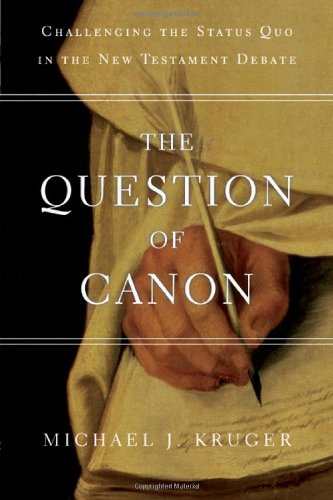Book review: The Question of Canon
by Michael J. Kruger
★★★★★
The Christian “canon” refers to that set of books, complete and bounded, that we accept as scripture. Modern Bible scholars often examine the development of the canon from an extrinsic model, noting that the canon was formed over the course of several centuries as the church fathers selected their favorites. Many argue that Irenaeus, in the late second century, was the first to feel the need for an authoritative canon. But what if the selection of accepted writings was more intrinsic … that is, guided from within, rather than from without? What if the New Testament writers themselves understood that they were writing Scripture, and their work was quickly recognized and adopted as such, perhaps with God’s guidance?
Kruger doesn’t deny the extrinsic claims, that the canon was fluid and argued over for centuries. He simply highlights the evidence that our New Testament writers were knowingly writing Scripture, and our earliest Scripture readers knew it. This Kruger does by critically examining five tenets of the extrinsic model to see if they really do hold water. The five tenets he questions, in five chapters, are:
1. We must make a sharp distinction between Scripture and canon.
2. There was nothing in earliest Christianity that might have led to a canon.
3. Early Christians were averse to written documents.
4. The New Testament authors were unaware of their own authority.
5. The New Testament books were first regarded as Scripture at the end of the second century.
Kruger hits his stride at about chapter three, and it gets stronger from there. So if you find the book winding up a little slowly, I promise it’ll be slinging fast balls by the end. Kruger’s research is convincing and well-argued, with generous footnotes. At the very least, this book will make you a believer in the passion and conviction of the New Testament writers, even as they sought to remain anonymous, letting the gospel message speak for itself on its own authority.












 354 Circles
354 Circles
 603 Goodreads Friends & Fans
603 Goodreads Friends & Fans

 Hello! I'm an author, historical Jesus scholar, book reviewer, and liberal Christian, which means I appreciate and attempt to exercise the humanitarian teachings of Jesus without getting hung up on any particular supernatural or religious beliefs.
The Bible is a magnificent book that has inspired and spiritually fed generations for thousands of years, and each new century seems to bring a deeper understanding of life’s purpose. This is true of not only Christianity; through the years, our age-old religions are slowly transforming from superstitious rituals into humanitarian philosophies. In short, we are growing up, and I am thrilled to be riding the wave.
I avidly read all thought-provoking religion titles. New authors: I'd love to read and review your book!
Hello! I'm an author, historical Jesus scholar, book reviewer, and liberal Christian, which means I appreciate and attempt to exercise the humanitarian teachings of Jesus without getting hung up on any particular supernatural or religious beliefs.
The Bible is a magnificent book that has inspired and spiritually fed generations for thousands of years, and each new century seems to bring a deeper understanding of life’s purpose. This is true of not only Christianity; through the years, our age-old religions are slowly transforming from superstitious rituals into humanitarian philosophies. In short, we are growing up, and I am thrilled to be riding the wave.
I avidly read all thought-provoking religion titles. New authors: I'd love to read and review your book!
 Hi! While Lee writes the articles and reviews the books, I edit, organize, and maintain the blog. The views expressed here are Lee's but I'm his biggest supporter! :-)
Hi! While Lee writes the articles and reviews the books, I edit, organize, and maintain the blog. The views expressed here are Lee's but I'm his biggest supporter! :-)
I wonder, did Kruger responded to the notion that, since most NT writers believed the world as we know it would end in their lifetimes, they could not have had either Canon or Scripture in mind for what they were writing?
We should take each NT book on an individual basis. But let’s note that most of them were written to discuss specific occasions, and not to clear up issues of all kinds for all times. Add to that that most were intended for very limited audiences, generally a congregation or geographical area. I can’t imagine any of the authors imagining that their words should be considered on par with the Torah, including “John” of the Apocalypse. 2 Peter 2:15-16 was written around 120-130 CE, as the notion of a NT canon was first being discussed. One other thing: the idea of Apostolic succession, which controls the formation of the canon, is a myth generated to ensure that the content of the canon remained in orthodox hands.